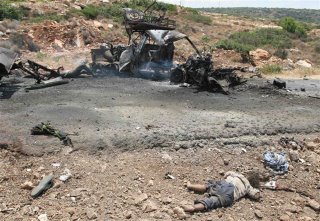Rice:
Jerusalem - US Secretary of State Condoleezza Rice said on Monday that a ceasefire and lasting solution to the Lebanon crisis could be reached this week, just before winding up her Middle East peace drive.
"As I head back to Washington, I take with me an emerging consensus on what is necessary for both an urgent ceasefire and a lasting settlement," Rice told reporters.
"I am convinced we can achieve both this week," said Rice, who laid out broad principles of a proposed deal, but did not discuss exact measures that would be adopted to put it in place.
Olmert:
Prime Minister Ehud Olmert vowed Monday that there "will be no cease-fire in the coming days," and his top security officials unanimously approved a widening of Israel's military operations on the ground in southern Lebanon after a four-hour meeting that ended early Tuesday morning, government officials said.
What exactly "convinced" Rice after her talks with the Israelis? Olmert has no intention of endorsing a ceasefire, in fact Israel has voted to expand the offensive. Simply amazing, that while the UN debates ending the crisis, Israel plans more operations. Either Rice's visit was a diplomatic failure, or this whole exercise was nothing more than convenient posturing to look relevant. Given Bush's comments today, the latter would appear more accurate. Despite Rice's public statements, it is obvious that behind the scenes her visit was nothing more than a war planning exercise. The only other option, Olmert lied to Rice's face and didn't divulge Israel's near term intentions- who believes that?

